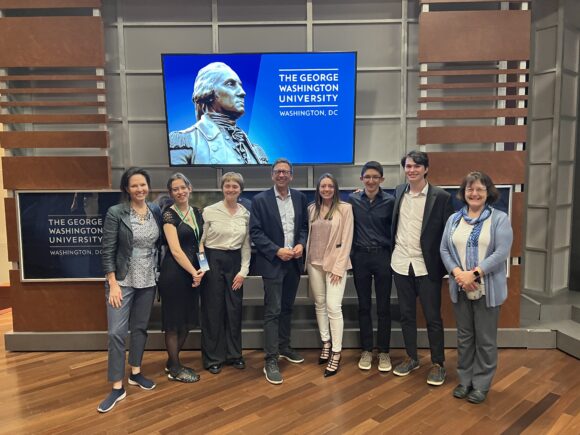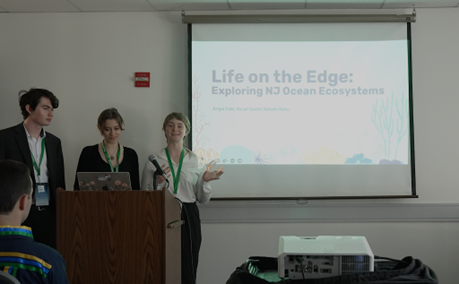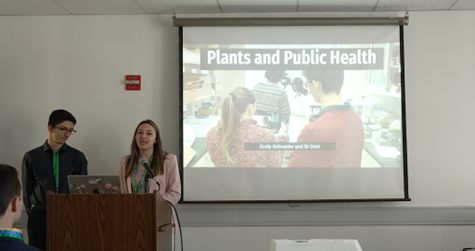
SEBS science-in-action video storytelling team with Planet Forward founder and Emmy winning journalist Frank Sesno. From L-R, Dena Seidel, Angie Catt, Natalie Radu, Frank Sesno, Emily Schneider, Or Doni, Micah Seidel, Xenia Morin.
Five Rutgers undergraduates doing independent research in immersive learning through science storytelling presented rough edits of their science-in-action films at the Planet Forward environmental storytelling summit in Washington DC on April 20. Working in teams, the undergraduates presented two student-authored science stories that they have developed in trusting partnership with scientists from Rutgers School of Environmental and Biological Sciences (SEBS) about New Jersey marine ecosystems and plant products developed for public health.

Undergraduate students Micah Seidel, Angie Catt and Natalie Radu present their science-in-action video story about New Jersey Marine Ecosystems at the Planet Forward Summit in Washington DC.
Natalie Radu, a sophomore business major, minoring in plant biology, has a passion for science storytelling. During COVID, she developed her own YouTube series sharing home based hydroponic methods for food production. “I saw Fields of Devotion and said, this is exactly what I and so many other science students need and want to be doing.” As part of an Agriculture and Food System independent study offered by Xenia Morin, Natalie is currently completing a 10-minute science-in-action film with SEBS undergraduates Angie Catt and Micah Seidel that follows Daphne Munroe’s research studying the impact of oyster farms on horseshoe crab migrations to New Jersey beaches. Dena Seidel is their science storytelling advisor and as part of the original immersive science learning through science storytelling model Seidel has championed, she transferred several hours of science-in-action footage to the students for them to shape into film stories using only the voices of the featured scientists.
Emily Schneider, a sophomore engineering student, minoring in Agriculture and Food Systems, and Or Doni, a first year studying biological sciences, reached out to Jim Simon requesting immersive science learning opportunities in his lab. Simon suggested they consider making a story about plant biology graduate students who are developing a natural insect repellent from compounds found in catnip. Emily and Or have since been working with Simon and Dena Seidel to interview and film five graduate students who work together developing a scalable and marketable natural insect repellent that could potentially save many lives.

Undergraduate students Or Doni and Emily Schnieder present their science-in-action video story about Plants and Human Health at the Planet Forward Summit in Washington DC.
“We began by reading the graduate students’ research papers so that we were fully prepared to interview and film them. These scientists have dedicated years of their lives to this project and so by creating this story, we are learning both about science and about the process of applying science in a way that truly benefits society” says Or Doni.
“We are science translators and this independent research project has taught us so much from the complexity of collaborative science to ways to effectively communicate this science to our peers,” says Emily Schneider.
As of this year, Rutgers SEBS is a consortium school of Planet Forward’s environmental storytelling initiative out of George Washington University. Dena Seidel, Xenia Morin and the five Rutgers undergraduates led a workshop on Science-in-Action Filmmaking: Immersive Learning through Storytelling to a full audience who then provided constructive feedback to the students after viewing their science stories in progress.
Next year, SEBS science storytelling students can apply to be Planet Forward correspondents, funded opportunities to produce science stories that are then shared and distributed internationally by Planet Forward. These science focused undergraduates will be presenting their sciences stories in development at Rutgers day at the SEBS food system storytelling booth.

